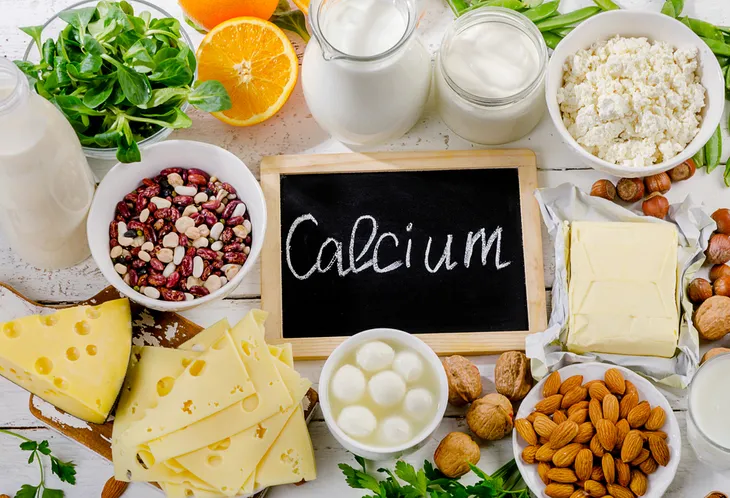- Losing weight requires burning more calories than you consume each day and a person’s metabolic rate determines calorie burn.
- Vitamins B and D can help boost metabolism.
- Calcium and iron are also important micronutrients for metabolism.
- Regular exercise (including strength training) is important for overall health.
Modern sedentary lifestyles and an abundance of calorie-dense foods can make it difficult for some people to maintain a healthy weight. The Center for Disease Control stresses the importance of trying to maintain a healthy weight as obesity can increase a person’s risk of developing certain diseases, such as type 2 diabetes. Losing weight takes consistent effort, but knowing how the body’s metabolism works and how nutrition can affect body composition can help people improve their chances of success.
How Does Weight Loss Work?
The foods and drinks we consume contain energy in the form of calories. The body uses that energy to sustain itself. When a person consumes more calories than their body needs on a day-to-day basis, the body stores some of that surplus energy as fat. This leads to weight gain. When a person consumes fewer calories than the body needs, the body breaks down that fat, and sometimes muscle tissue as well, to sustain itself, causing weight loss.
Some other things can cause temporary changes to the scales. For example, a person might retain water after a salty or carbohydrate-laden meal, making them gain a few pounds for a few days. Someone may notice they weigh less after exercising because they’ve lost a lot of water through perspiration. These small changes don’t involve fat gain or loss and are not what we’re considering in this guide.
You Burn Calories Even When You Sleep
Your metabolism is always working, even when you’re asleep. Most diet plans that involve counting calories reference things like the BMR and TDEE. It’s important to understand the differences between these terms.
- BMR. Your basal metabolic rate is the number of calories your body would burn in 24 hours if you were bedridden and not moving at all. Getting up and walking around, eating and even sitting at a desk and working all burn extra calories.
- TDEE. Total daily energy expenditure is the number of calories your body uses on an average day. Even a relatively sedentary person who works in an office burns about 1.3 times their BMR on a typical day. Exercise burns extra calories.
- Calorie deficit. Weight loss occurs when you consistently consume fewer calories per day than your body needs. If your TDEE is 2000 calories, and you eat 1500 per day, you have a deficit of 500 calories.
In general, to burn one pound of fat, you need to create a deficit of 3,500 calories. That would mean sticking to a 500-calorie deficit for one week.
Can You Speed Up Your Metabolism?
Many people who struggle to lose weight fear that they have a slow metabolism. While it’s true that some people have a faster metabolism than others, the difference between a fast and slow metabolism is usually quite small. Some medical conditions can make a person’s metabolism slower than average; however, even people with a hypoactive thyroid can generally manage their weight with proper support and guidance.
People who are heavier often burn more calories per day than people who are lighter because both fat and muscle are metabolically active. Muscle requires more calories to sustain than fat, so someone who has more muscle mass usually needs more calories per day than a person with a similar weight who has less muscle mass. Good nutrition can also contribute to a healthy metabolism.
Vitamins That Can Promote a Healthy Metabolism
The process of breaking down food and drink and turning it into energy the body can use is a series of chemical reactions. For the body to perform these reactions, it needs the right nutrients. This means eating a balanced diet, including the right vitamins and minerals, can help boost your metabolism. Good nutrition also has the side benefit of improving your overall well-being, which means you’ll feel more energetic and find it easier to exercise.
 Ropisme / Shutterstock
Ropisme / ShutterstockThe B Vitamins
The B vitamins play an important role in energy metabolism. Research performed on rats found that supplementing the intake of B vitamins increased their metabolic rate, helping prevent weight gain when the rats were fed a high-fat diet. Vitamin B is found in poultry, eggs and green, leafy vegetables.
Vitamin C
Vitamin C is best known as being the vitamin that “helps stave off colds.” However, one study found that people with higher levels of vitamin C in their bloodstream tended to have a lower body mass index and a smaller waist circumference. It’s unclear whether this is because people who get enough vitamin C are more health-conscious or whether vitamin C has a role to play in increasing our metabolic rate.
Vitamin D
The human body is capable of making its own vitamin D; however, it requires exposure to sunlight to do so. People who live in parts of the world that see shorter periods of daylight during the winter months may not get enough time in the sun to produce sufficient vitamin D. Those who work indoors or are housebound may also have a vitamin D deficiency. It’s unclear what role vitamin D plays in weight loss; however, one study found that overweight or obese people who take vitamin D supplements lose visceral fat more quickly than those who do not.
Other Nutrients and Your Metabolism
Vitamins are just one type of essential nutrient. The human body also needs certain kinds of minerals to function properly, and some of those minerals are also thought to be important for metabolic health. Two of these nutrients are calcium and iron.
Calcium
Calcium is important for bone health, and it works in tandem with vitamin D to support other functions in the human body. The previously mentioned visceral fat study also included supplementation of vitamin D. Calcium is found in many dairy products, and it’s particularly important for women to make sure they’re getting enough of this mineral because it can help to prevent osteoporosis.
Iron
Iron helps blood cells transport oxygen around the body. Our cells use that oxygen to perform their metabolic duties. Anemia (iron deficiency) can leave a person feeling weak and tired. Women who experience heavy menstrual periods may be at risk of anemia. People who have anemia may find that supplementing iron or consuming foods fortified with the mineral gives them more energy and, therefore, makes it easier to exercise and burn fat.
Other Ways to Promote Weight Loss
Many diet gurus reduce weight loss to the idea of “eat less and move more.” While this basic statement is true, long-term sustainable weight loss requires more thought and lasting lifestyle changes. Someone who has a lot of weight to lose will likely find that they lose weight (and fat) rapidly when they first start dieting. However, as they lose weight, the number of calories they need to consume per day will fall.
This doesn’t mean that their metabolism is broken or damaged. Rather, it means they have fewer metabolically active fat cells to sustain. Over time, a person will need to recalculate their TDEE and adjust their diet to maintain weight loss.
Exercising regularly can help increase the number of calories burned per day. It’s a good idea if some of that exercise is strength training. Lifting weights or performing resistance exercises helps to build muscle. This is important because muscle is denser than fat and burns more calories per pound, even when idle.
Weight Loss vs. Fat Loss
Another reason that many people lose weight quickly when they first start dieting is that they switch from a junk-food-rich diet to a more balanced, healthier one. A lot of the initial weight loss is water weight rather than fat. After the first week or two, the rate of weight loss slows down. It’s important not to get demoralized if this happens.
Weight loss is rarely a linear process, and plateaus in progress can be common, especially the closer someone gets to a healthy weight. Over time, sticking faithfully to a diet and exercise program will pay off.
Supplementing vitamins and minerals can make losing weight slightly easier, but there’s no magic pill that will make fat loss a quick or truly easy process. Lasting lifestyle changes are necessary for people who want to reach, and stay, at a healthy weight.














